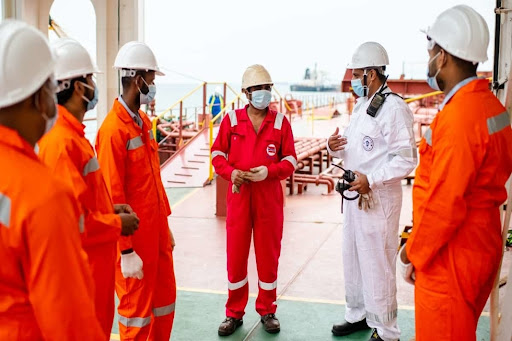
Crew change crisis: More IMO member states need to act

LONDON : This time last year, every crew change successfully achieved seemed exceptional. They were complex tasks involving multi-faceted challenges and ‘unknowns’ as government instructions and medical advice changed frequently, even daily.
Since then, the international shipping community has adapted to the new status quo brought about by the pandemic. The industry’s efforts to convince state and local authorities to recognise seafarers as key workers have made a difference, but crew changes continue to be challenging in many parts of the world.
Conditions for crew changes around the world have improved in the last six months, but not by enough. The global shipping community needs to maintain its pressure on IMO member states, says Ian Boyd, Group Sales Director – Shipping for the GAC Group.
By May 2021, only 55 out of the IMO’s 174 member states had recognised seafarers as essential workers. That number has now reached 60: still not enough. Pressure needs to be kept on the more than 100 states yet to act
Of the estimated 1.7 million seafarers worldwide, more than half are from countries with vaccination programmes that lag behind those of richer nations. Many seafarers still cannot access the vaccines that could help to make their passage to and from home a realistic prospect.
On a more positive note, some IMO member states are working to improve seafarer vaccination rates: the US, India, Germany, Cyprus, Belgium, Netherlands and Australia to name a few. These efforts are, almost without exception, driven by local NGOs and authorities linked to the industry. Among those campaigning to ease the plight of the maritime workforce is the Global Maritime Forum’s Neptune Declaration on Seafarer Wellbeing and Crew Change – of which GAC is a signatory.
Industry-wide vaccination is key to solving the crisis. More states must prioritise seafarers, and developed nations must use their stocks to boost dedicated vaccination programmes for seafarers passing through hubs such as Singapore, Rotterdam, UAE ports, Houston and others.
Sadly, it is easier said than done.
Global dynamics
Pre-planning of crew changes remains critical, as does the ability to adapt to changes in procedure at short notice. In Oman, the GAC team reports that authorities are closely monitoring crew change procedures and precautions being taken to minimise the risk of spreading Covid-19. GAC has earned their support, but crew changes are still managed on a case-by-case basis in light of updates to health and travel advisories. Our people in Abu Dhabi have noted an increase in the number of procedures and medical tests required, depending on the nationalities of the seafarers involved.
In India, GAC has successfully prepared and coordinated multiple crew changes, even when last-minute information and action has been required.
The development of checklists and standard requests for information from customers has helped to ensure GAC has all the necessary information on hand when dealing with local authorities. Requirements can vary. GAC Panama, for instance, notes the need for unified and digital (not just scanned) information to satisfy the various needs of different local authorities.
In Europe, more coordination and closer contact with local immigrations and health authorities is the new normal. In Russia, however, crew members without a Russian visa face greater difficulties than locals or those from visa-free countries. GAC’s recommendation here is that seafarers should always obtain a visa, even if they hold a valid Seaman’s Book.
In Australasia, GAC teams highlight the importance of closely following local procedures. This is particularly important in Australia, where it is vital to keep up to date with local travel restrictions that vary from state to state and week to week.
In Sri Lanka, GAC has worked with authorities to perform direct bulk crew changes via exclusive charter flight, and gained special permission to conduct emergency disembarkations at the country’s ports. This proved its worth in the evacuation of a sick passenger from a cruise vessel, granted on humanitarian grounds after an arduous approval process granted.
Sanitation services
Maintaining the highest sanitation and social distancing standards is critical. Even a small mishap can delay vessel quarantine or free pratique approval, so GAC’s offices globally have adapted quickly to ensure that the highest standards are maintained.
GAC and its local partners in Sri Lanka have pioneered a fumigation, disinfection and sanitisation service for vessels at the country’s four ports. The deep cleaning service is offered to vessels sailing the East-West shipping routes that pass close to Sri Lanka. Since its launch in 2020, GAC has met the requirements of over 10 vessel operators, giving them confidence in the safety of their crew and any local authorities’ personnel who may need to board.
Security team challenges
The transfer of armed guards is still a challenge. In the past, security teams on board floating armouries around the Red Sea, Western Indian Ocean and Gulf of Oman were not allowed to disembark due to stringent regulations on transfers globally. But when the number of Covid-19 positive cases onboard these floating armouries rose significantly, GAC Sri Lanka invested in a villa complex as an accommodation solution for private maritime security companies and law enforcement officers.
More to come
The shipping industry must continue supporting seafarers, maintaining pressure on all IMO member states to designate them as key workers.
With crews still stranded onboard beyond their contracted period, stress and fatigue is as serious an issue as the potential for serious illness due to the slow vaccination roll-out. And with new variants of the virus emerging, we are unlikely to have seen the last of the challenges of the Covid-19 pandemic yet. As a ship agent responsible for port and husbandry services, and an advocate for shipping companies and seafarers worldwide, GAC will continue to adapt and respond accordingly.
Source : Seatrade Maritime News

